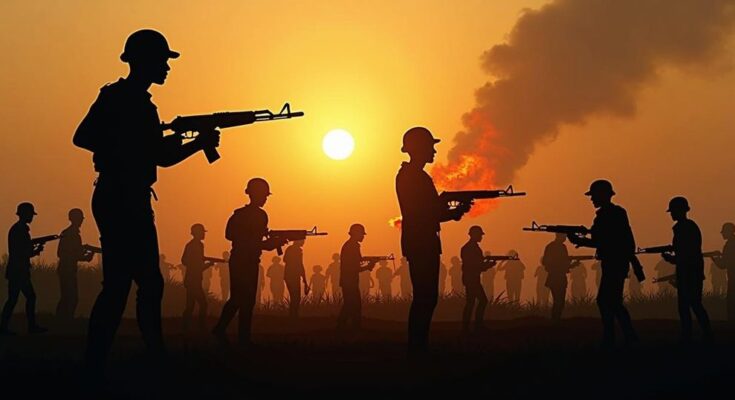Rwandan Foreign Minister Olivier Nduhungirehe reported that his Congolese counterpart rejected a deal designed to alleviate the M23 conflict, which has displaced over 1.7 million people. Despite negotiations aimed at addressing the insurgency, disagreements over the implementation of measures against the FDLR have hindered progress, showcasing the complex dynamics between both nations.
In a recent development concerning the ongoing conflict in the eastern Democratic Republic of Congo, Rwandan Foreign Minister Olivier Nduhungirehe asserted that his Congolese counterpart declined to endorse a previously agreed-upon arrangement intended to mitigate the tensions involving the M23 rebel group. This insurgency, which emerged in 2022, has exacerbated a humanitarian crisis that has displaced over 1.7 million individuals in the region. The M23, predominantly composed of Tutsi fighters, has been accused by the Congolese government and the United Nations of receiving military support from Rwanda, a claim that Rwanda has vigorously denied. Instead, Rwanda maintains that it is conducting defensive operations and has accused Congo of collaborating with the Democratic Forces for the Liberation of Rwanda (FDLR), a Hutu rebel faction implicated in attacks against Tutsis in both nations. Negotiations were held in late August with the participation of both countries, aiming to alleviate the conflict’s impact. According to Nduhungirehe, an understanding had been reached among the attendees, which included Congo’s head of military intelligence, culminating in an agreement to neutralize the FDLR and subsequently alleviate Rwanda’s defense posture. However, when it came time for formal approval, the Congolese minister expressed opposition to the final report, resulting in no signature from her side. The proposed plan stipulated that actions against the FDLR would be prioritized, followed shortly by a reduction in Rwanda’s defensive measures, a sequencing that the Congolese minister reportedly contested, insisting on simultaneous implementation. As the situation evolved, both leaders from Congo and Rwanda attended a summit in France, wherein discussions led by French President Emmanuel Macron aimed to facilitate direct dialogue, though ultimately, they engaged in separate meetings with the President. The lack of consensus at these negotiations underscores the complexities underlying the regional dynamics and the ongoing humanitarian crisis.
The conflict involving the M23 in the eastern Democratic Republic of Congo is deeply rooted in historical ethnic tensions and geopolitical rivalries in the region. The M23 group, composed primarily of Tutsi fighters, capitalizes on the long-standing grievances stemming from the Rwandan Genocide and the subsequent unrest in the Great Lakes region. The ongoing strife has resulted in dire humanitarian conditions, with millions displaced and vulnerable to violence. Rwanda’s alleged support for the M23 rebels has been a contentious point, contributing to strained bilateral relations and complex military engagements with multiple actors, including the FDLR, which has been accused of perpetrating atrocities against Tutsis. Understanding the interplay of these factors is crucial to grasping the ongoing negotiations and the urgent need for a sustainable resolution.
In conclusion, the refusal of the Congolese Foreign Minister to sign the proposed plan to address the M23 conflict illustrates the persistent challenges in resolving tensions between Rwanda and the Democratic Republic of Congo. The agreement aimed at neutralizing the FDLR while adjusting Rwanda’s defense measures highlights the delicate balance and the necessity for mutual cooperation to address regional instability. As diplomatic efforts continue, the humanitarian needs of those affected by these conflicts remain paramount, calling for urgent and effective solutions from all involved parties to achieve lasting peace.
Original Source: www.usnews.com




